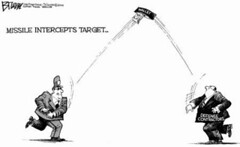 link
linkDemocracy may be under threat here (here being the good old USofA) but it does seem to be working rather better this week in Canada. There is lots of blither in the media about the Canadian Liberal party government deciding not to sign on with the US missile defense scam. Really, is there anyone who doesn't work for a war contractor who believes this thing will ever do anything except enrich some corporate stockholders?
The Toronto Globe and Mail explains the decision simply and cogently, albeit in the last paragraph of a long story:
A number of senior government sources have recently told reporters in The Globe and Mail's Ottawa bureau that the federal government felt that the deep unpopularity of missile defence among Canadians made further participation a non-starter.
Yes -- Canadians do spell it "defence."
Naturally the US administration has responded with its standard form of spin: take the language of your opponents and twist it to mean its opposite:
"Although Prime Minister Paul Martin said Canada would 'insist' on maintaining control of its airspace, U.S. Ambassador Paul Cellucci warned that Washington would not be constrained. 'We will deploy. We will defend North America,' he said.
'We simply cannot understand why Canada would in effect give up its sovereignty -- its seat at the table -- to decide what to do about a missile that might be coming towards Canada.'"
BWAAHH! I thought Canada was asserting its sovereignty against the elephant next door, but what do I know? Only how we are supposed to consume the media in George W's USA: brainlessly.
1 comment:
Delicious Canadian commentary on US arrogance can be read here.
Missile Counter-Attack: Axworthy fires back at U.S. -- and Canadian -- critics of our BMD decision in An Open Letter to U.S. Secretary of State Condoleezza Rice. One great bit:
Coming to Ottawa might also expose you to a parliamentary system that has a thing called question period every day, where those in the executive are held accountable by an opposition for their actions, and where demands for public debate on important topics such a missile defence can be made openly.
You might also notice that it's a system in which the governing party's caucus members are not afraid to tell their leader that their constituents don't want to follow the ideological, perhaps teleological, fantasies of Canada's continental co-inhabitant. And that this leader actually listens to such representations.
Your boss did not avail himself of a similar opportunity to visit our House of Commons during his visit, fearing, it seems, that there might be some signs of dissent. He preferred to issue his diktat on missile defence in front of a highly controlled, pre-selected audience.
Such control-freak antics may work in the virtual one-party state that now prevails in Washington. But in Canada we have a residual belief that politicians should be subject to a few checks and balances, an idea that your country once espoused before the days of empire.
Post a Comment